- July 8, 2025
-
-
Loading

Loading
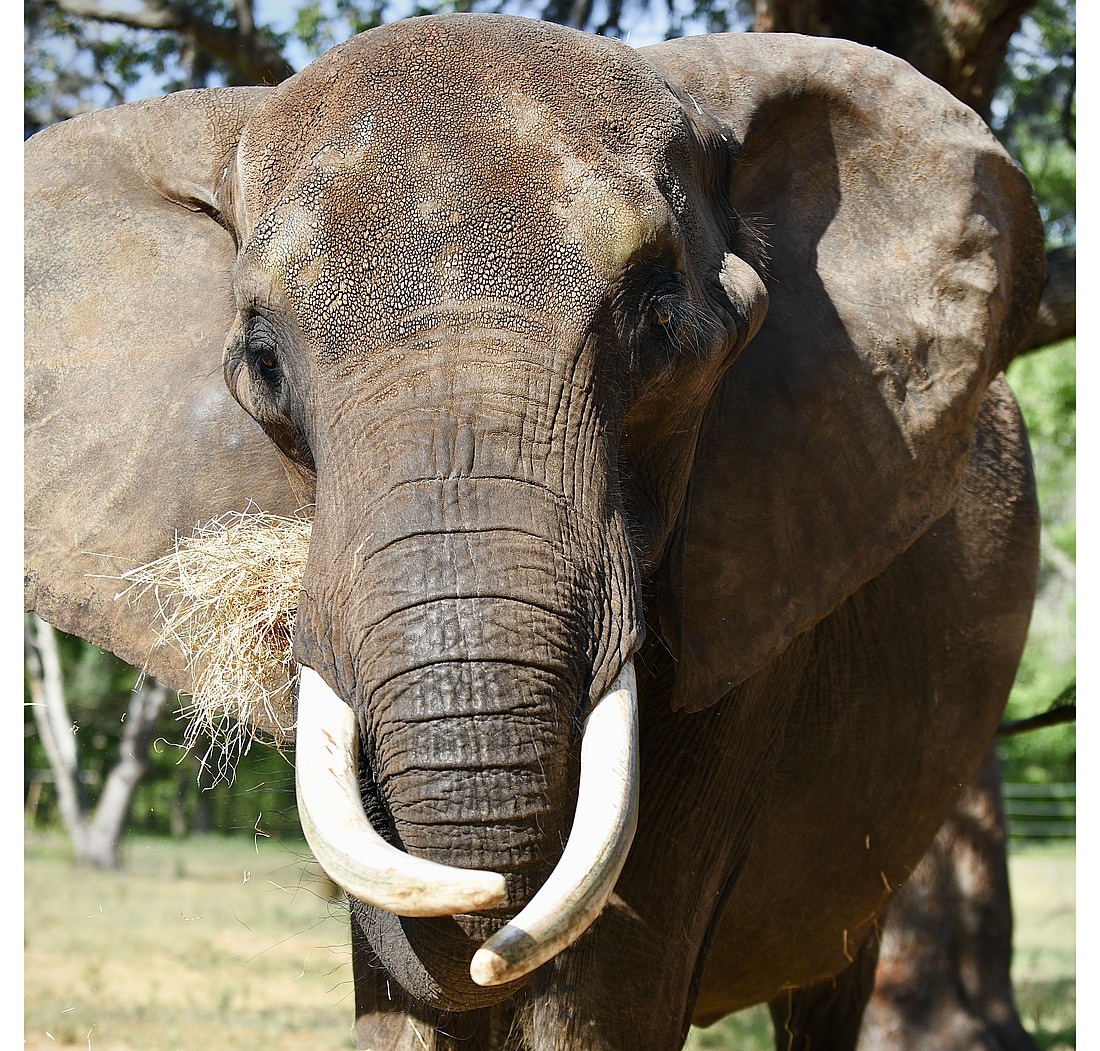 Photo by Heidi Kurpiela
Photo by Heidi Kurpiela
On a picture-perfect spring morning in Myakka City, Lou is getting her daily spa treatment. The 45-minute ritual consists of a deep scrub, a long soak, and skin care that includes aloe and coconut oil. She’s also getting her toenails done. By all appearances, the 39-year-old African savanna elephant is loving it. She preens and poses, glugs water from a plastic trash can and makes a purring sound not unlike that of a house cat — if a house cat weighed over 8,000 pounds.
The purr — a low rumble that’s not especially loud — signals that Lou is relaxed and comfortable, says Jorge (“George”) Barreda, part of the family that runs Myakka Elephant Ranch, a 30-acre compound that three elephants call home.
Lou’s spa session takes place in front of about two dozen people seated on a small set of bleachers in an open-air barn. The attendees have paid $89 each ($69 for those under age 9) to bathe, touch and take photos with the resident elephants — animals that most of us have only seen from a distance in zoos. And each attendee walks away with a headful of knowledge about these majestic creatures.
Audience members are encouraged to put in some work. Two by two, they come forward to spray Lou with a hose, or scrub her massive frame with a long-handled brush or clean her toenails with a smaller one. The program is emceed by Jorge and his son, Lou Barreda. In 2019, Lou, 30, founded Myakka Elephant Ranch as a 501(c)(3) nonprofit and took on the role of chief executive. COO Julia Braren, Jorge’s daughter and Lou’s sister, sits out front at the check-in area. Father and son orchestrate the audience’s pachyderm primping while serving up a stream of interesting tidbits. Example: An African elephant’s trunk is capable of lifting 600 pounds — and can also pick up a dime off the ground.
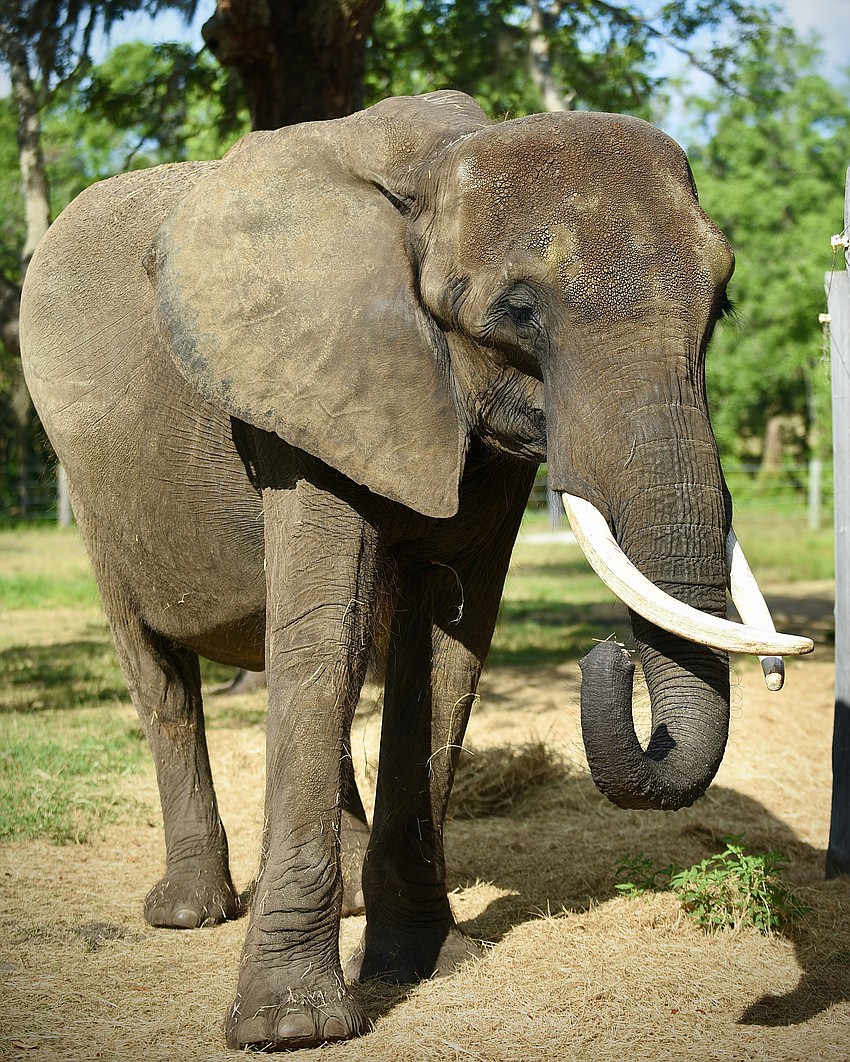
With the world’s elephant population dwindling, circuses dropping elephant shows and some zoos phasing out exhibits, sanctuaries such as Myakka Elephant Ranch provide a relatively humane way for people to mingle with the world’s largest land animals. The experiences are filled with messaging about the plight of these smart, sensitive creatures. Preservation and education are the core tenets of the Myakka Elephant Ranch mission.
Still, there’s no denying the fun. The highlight of the two-hour experience is when audience members get to come forward to pet Lou and Carol, an Asian elephant from Thailand. Patty, another Asian elephant that came to the ranch as a pair with Lou, is less comfortable around people so sits this part out.
The Asians are stockier, with shorter, heavier legs, smaller ears, no visible tusks and smoother skin. Carol and Patty, both 50, don’t have Lou’s charisma, and there’s a reason for that. Every elephant herd, no matter how small, has a matriarch. That’s Lou. She’s been with the Barreda family since she was a year-and-a-half old. “Lou’s definitely the boss,” says Lou the human.
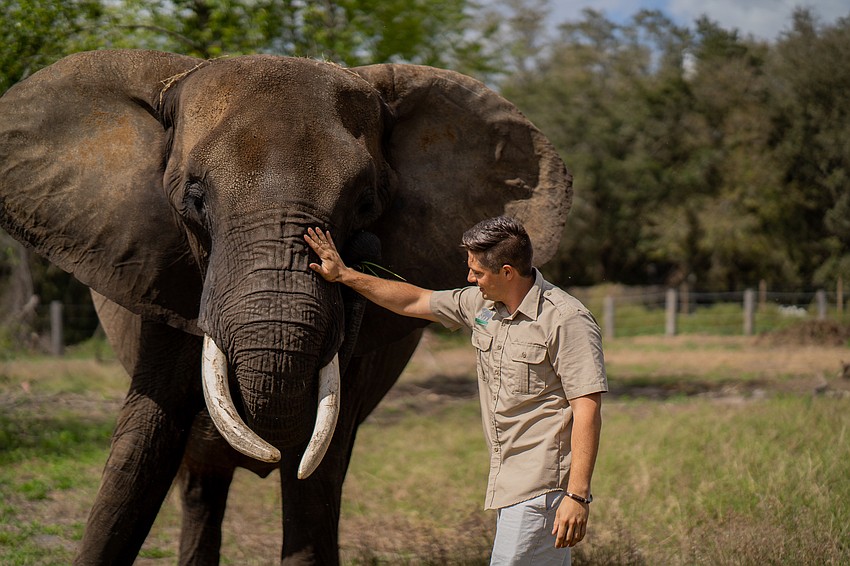
For this writer’s photo op, I hug Lou’s trunk and cup my hand around her smooth, 2-foot tusks. I hang around for a while, petting her leathery skin. Lou gently nudges me with her tusk. It was a friendly gesture, the sheer force of which moves me a couple of feet. I laugh and look upward, straight into her tiny left eye. Lou pokerfaces me back.
We had a moment — I think.
The Myakka Elephant Ranch is a decidedly family affair. The corporate officers consist of Lou Barreda, Jorge and his wife, Lou Ann, and Julia Braren and her husband, Kellen.
The Barreda clan’s relationship with elephants goes back decades. Jorge and Lou Ann owned a business that rented elephants to, he says, “all kinds of events — birthday parties, weddings, documentaries, theme parks, state fairs, circuses, zoos.”
In 1986, the Barredas moved their operation from Oklahoma — where it got too cold for elephants, Jorge says — to the current location. The kids grew up around the jumbo pachyderms, as many as six of them, and helped with their care.
Several years ago, Jorge and Lou Ann shut down the for-profit business and retired. Meanwhile, Lou had completed a marketing degree at Florida Gulf Coast University. “I’d always been around elephants and loved the elephants but never really saw a clear future in it,” he says, standing by a stall in the barn. “But when we started making it all about conservation, education and making it a nonprofit, that’s really when I wanted to get involved.”
According to public records, Lou filed corporate papers for the Myakka Elephant Ranch on Oct. 14, 2019. A week later, he was off to the International Elephant Conservation and Research Symposium in South Africa. (He has since become a board member of the International Elephant Foundation, which presents the seminars.) Lou subsequently did a two-week internship at a zoo in Berlin to learn more about elephant care.
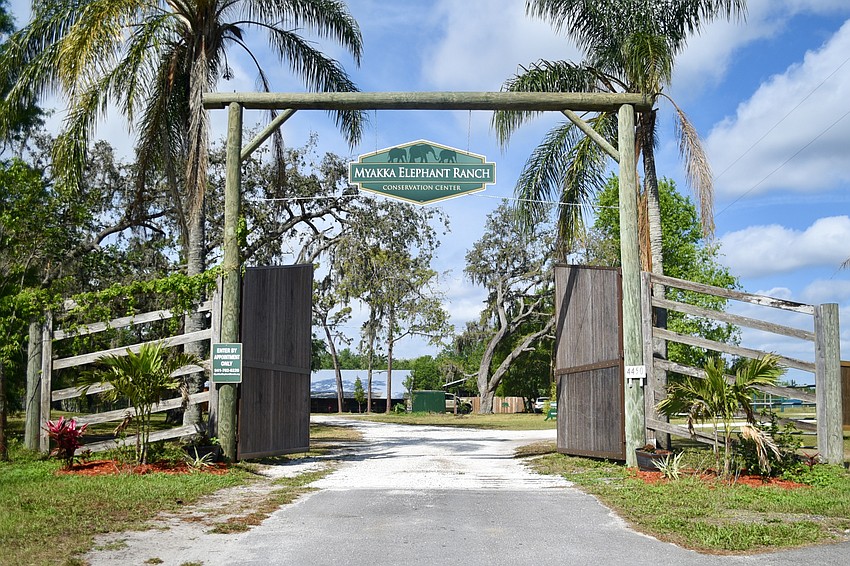
The ranch began offering its live programs in November 2020. The four separate encounters run five days a week and range in price from $29 to $199. They’re over by early afternoon, after which the gentle behemoths have the run of the property. Well, not run, actually. They’re getting on in years, so moseying is more their thing. A crudely built pool, which acts as a watering hole, sits just behind the barn.
“They don’t require much supervision,” Lou says of his charges. “I’ll check on them at about six o’clock. I just talk to them like you would talk to your pet dog. You can do baby talk; you can talk seriously to them. They understand almost everything that’s going on. Sometimes I come in and don’t even have to say anything.”
Many local nonprofits get by on a shoestring and struggle to stay out of the red. By contrast, Myakka Elephant Ranch runs well in the black. The encounters, which as of early April were booked out a couple of months in advance, more than cover the roughly $500,000 a year required to operate the facility and care for the animals, Lou says. “We keep the experiences smaller,” he adds. “We could be losing some funding by doing that, but it keeps them more intimate.”
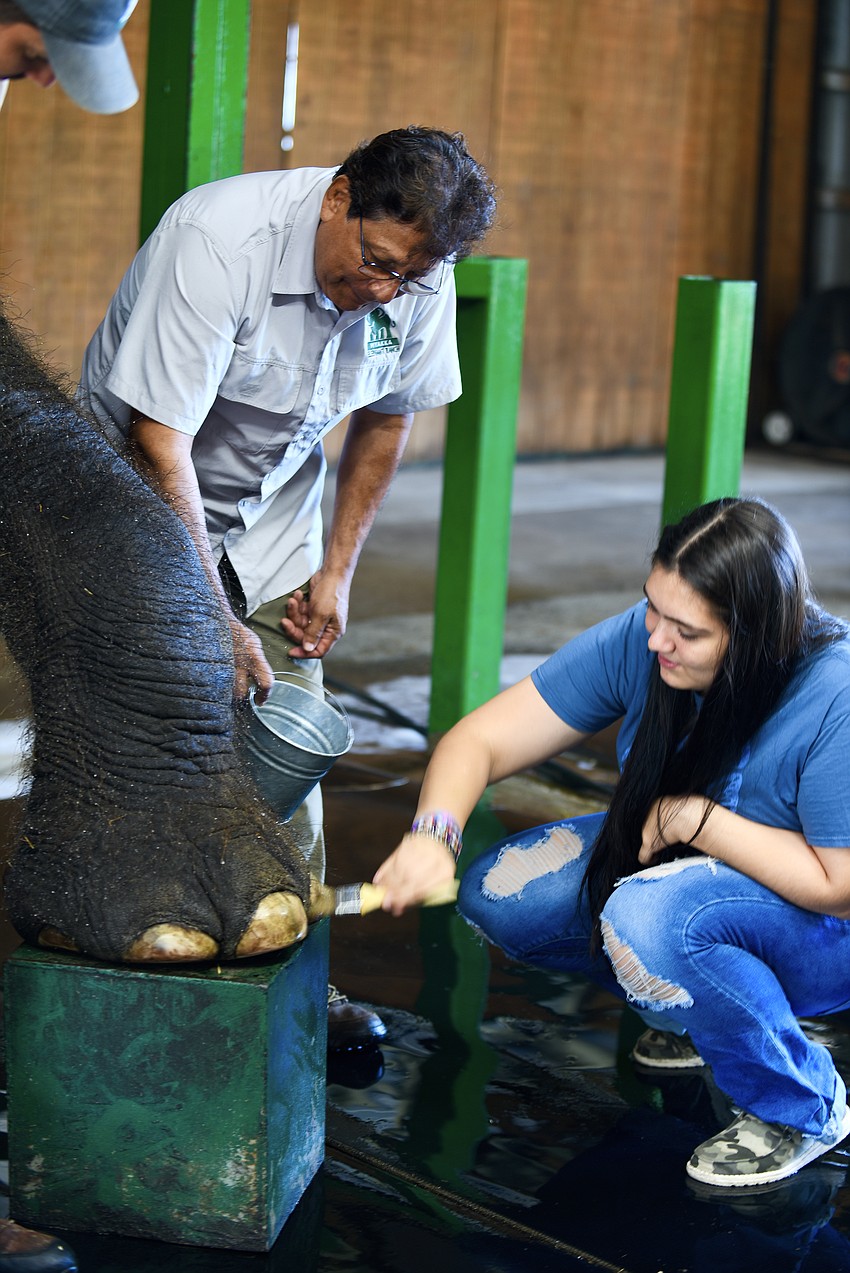
In 2022, Myakka Elephant Ranch contributed $54,000 to the International Elephant Foundation and two other nonprofits focused on elephant conservation and research, according to Julia Braren.
Lou says that the ranch staff does not have time to mount a fundraising campaign but still brought in just over $50,000 in donations last year. That money goes to capital projects (like the watering hole), as well as expanding and improving the habitats.
The ranch sets aside 10% of its encounters to offer for free to education and nonprofit groups. They include The Haven in Sarasota, Loveland Center in Venice — both of which serve people with developmental disabilities — Wheelchairs 4 Kids and Operation Warrior Resolution, which provides holistic mental health care for veterans and their families.
Braren, who spearheads the organization’s outreach program, tells the story of a veteran suffering from PTSD who attended the ranch’s elephant yoga therapy class, where attendees do their downward dogs with elephants grazing in the background. “He never thought being around an elephant could change his life,” she says of the veteran. “He said he never would have sought help, but having the experience connected him with Operation Warrior Resolution, and that in turn saved his life.”
Braren also founded and runs the ranch’s Conservation Pen Pal Program and Art Exchange Program, where American and African children exchange letters and artwork about their love of elephants.
The Barredas have expansion dreams for their elephant haven. Lou hopes to bring in younger ones, including males, for breeding. He envisions as many as 30 elephants roaming 30 acres or more. That’s ambitious, but regardless of when or if all that transpires, he and his family members will be caring for their beloved behemoths over the long haul.
“Elephants are such a lifelong commitment,” Braren says. “It’s not even an animal, really. It’s pretty much a member of your family.”